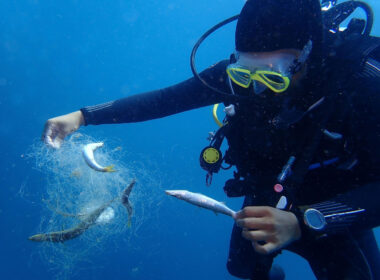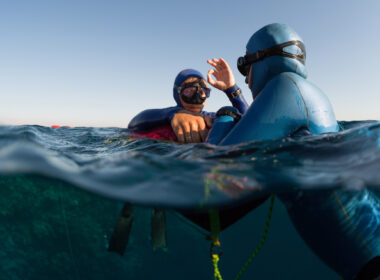The mesmerizing underwater world captivates divers with its vibrant marine life and dazzling coral reefs. However, amidst the awe-inspiring beauty, it’s crucial to remember our responsibilities as divers—to safeguard both our dive buddies and the delicate marine ecosystems.
It’s all too easy to become absorbed in the underwater wonders, inadvertently neglecting the well-being of ourselves, and our fellow divers or risking damage to the environment. A responsible diver not only prioritizes the protection of marine life but also ensure their own protection by purchasing comprehensive diving insurance and being well-versed in emergency procedures. Learning how to act in emergencies, along with knowledge of the necessary local emergency numbers, adds an extra layer of responsibility to the diving experience.
Have you ever wanted to get that last photo, despite your dive buddy being low on air and signaling to ascend? Or have you gotten closer to the reef than you should to get a good look at that cute, tiny nudibranch, putting yourself and the coral reef at risk?
In this article, we cover how you can become a more responsible diver towards the underwater world and your dive buddies. Want to know more about being a responsible diver? Take the Green Fins E Diver course, DiveAssure members get a 10% discount!
What Does It Mean to Be a Responsible Diver?
The world beneath the waves holds a breathtaking array of beauty and wonders. As scuba diving enthusiasts, it is our privilege and responsibility to ensure the preservation of these underwater ecosystems. Being a responsible diver involves more than just donning a wetsuit and exploring the depths—it requires a commitment to sustainable practices, marine conservation, and environmental stewardship. Here are a few things that you can do to become a responsible diver:
Obtain Proper Training and Certification:
First and foremost before embarking on your diving adventures, it is crucial to acquire the necessary training and certification from a reputable diving center and training agency. Enrolling in a certified scuba diving course will equip you with the knowledge, skills, and safety protocols required to navigate underwater environments responsibly. By learning proper diving techniques, you not only protect yourself but also minimize the potential for damage to marine life and habitats.
Respect Marine Life:
The diverse array of marine life you encounter while diving is a testament to the beauty and intricacy of nature. As a responsible diver, you must respect and protect this delicate ecosystem. Avoid touching, harassing, or feeding marine organisms. Maintain a comfortable distance from them, allowing them to go about their natural behaviors undisturbed. Remember, you are a visitor in their home, and observing from a respectful distance ensures their well-being and reduces stress.
Dive Within Your Limits:
Always dive within your comfort level and skill set. Be honest with yourself about your abilities and limitations. Avoid pushing yourself beyond your capabilities or attempting dives in challenging conditions that you are not prepared for. This ensures your safety and minimizes potential risks to yourself and your dive buddies.
Practice Proper Buoyancy Control:
Mastering buoyancy control is a fundamental skill for any diver. It not only helps you move effortlessly underwater but also minimizes accidental contact with delicate corals or marine life. Practice neutral buoyancy, which involves maintaining a hovering position without sinking or rising. By honing this skill, you can glide above fragile corals, avoiding unintentional damage caused by contact with your gear or body.
Safeguard the Dive Sites:
Preserving the integrity of dive sites is crucial for their long-term sustainability. Do not remove or collect any marine life, shells, artifacts, or souvenirs. Even seemingly small actions like resting on or holding on to coral formations can cause irreparable harm. Always use designated mooring buoys or anchor lines when available to avoid dropping anchors on sensitive habitats. Leave nothing behind except bubbles and memories.
Minimize your Environmental Footprint
Pollution poses a significant threat to marine ecosystems. Be conscious of the impact your diving activities may have on the environment. Do not discard any trash or debris into the water and make an effort to collect any you encounter during your dives. Use eco-friendly dive gear and cleaning agents to minimize pollution. Choose reef-safe sunscreens that do not contain harmful chemicals that can damage coral reefs. Every small action to reduce your environmental footprint can make a significant difference. When out on the boat, secure all items to ensure nothing falls into the water, and encourage other divers on board to act the same.
Educate Yourself and Others:
Knowledge is a powerful tool for creating positive change. Continuously educate yourself about the marine environment, local ecosystems, and conservation initiatives. Stay updated on the latest scientific research, advancements in sustainable diving practices, and regulations of the areas you visit. Share your knowledge and experiences with others, promoting responsible diving behaviors and fostering a deeper appreciation for our oceans.
Support Conservation Initiatives:
Supporting organizations and initiatives dedicated to marine conservation is a proactive way to make a difference. Consider joining or volunteering for local marine conservation groups, participating in reef restoration projects, or donating to reputable organizations that work towards preserving and restoring underwater habitats. By supporting these efforts, you contribute to the collective action needed to safeguard our oceans for future generations.
Join Your dive center for Beach and Underwater Cleanups
In recent years, our planet has faced increasing environmental challenges, especially when it comes to the health of our oceans. Plastic pollution, marine debris, and the degradation of coral reefs have become pressing issues that demand our attention and action. If you’re a nature enthusiast, an avid diver, or someone who simply cares about the environment and especially the ocean, joining your local dive center for beach and underwater cleanups can be a rewarding and impactful way to make a difference.
The Need for Beach and Underwater Cleanups
Our oceans are home to an incredibly diverse ecosystem, supporting countless species of marine life. Unfortunately, they have also become a dumping ground for human-generated waste, with an estimated 8 million metric tons of plastic ending up in the ocean each year. This pollution poses a significant threat to marine life, including turtles, fish, seabirds, and coral reefs. Beach and underwater cleanups play a vital role in removing this debris, reducing its harmful impact on the environment, and restoring the natural beauty of our coastal areas and underwater habitats.
Benefits of Joining a Cleanup Event
A Positive Impact on the Environment: By participating in beach and underwater cleanups, you actively contribute to the preservation and restoration of our oceans. Each piece of trash you collect helps prevent it from entering the marine ecosystem, protecting marine animals and their habitats from further harm.
Conservation Education: Cleanups provide an opportunity to raise awareness about the consequences of pollution on our oceans. As you engage in these activities, you not only become more informed about the issues at hand but can also share your experiences and knowledge with others, inspiring them to take action.
Community Building: Joining a dive center for cleanups allows you to connect with like-minded individuals who share your passion for the environment. Working together towards a common goal fosters a sense of community and camaraderie, creating lasting friendships and support networks.
How to Get Involved
Research Local Dive Centers: Look for dive centers or organizations in your area that regularly organize beach and underwater cleanups. They often have dedicated programs and events focused on conservation efforts. Contact them to inquire about upcoming opportunities and express your interest in participating.
Attend Training and Certification: Depending on your diving experience, you may need to acquire certain certifications or attend training sessions to ensure your safety during cleanups. Some dive centers offer specialized courses on underwater cleanup techniques and protocols, equipping you with the necessary skills and knowledge.
Volunteer and Engage: Once you’re ready to dive in, sign up as a volunteer for scheduled cleanups. Dive centers typically organize these events, providing the necessary equipment such as gloves, bags, and tools for debris collection. Be sure to follow all safety guidelines and instructions provided by the dive center to ensure a successful and secure cleanup.
Spread the Word: Share your experiences and promote the importance of beach and underwater cleanups within your social circles, online communities, and local media outlets. Encourage others to participate or organize similar events, expanding the reach and impact of these initiatives.
Beach and underwater cleanups offer a tangible way for individuals to contribute to the preservation of our oceans and marine ecosystems. By joining your local dive center in these efforts, you can make a significant impact on the environment, while also fostering a sense of community and inspiring others to take action
Remember, even a small contribution can create ripples of positive change. So, put on your diving gear, grab a bag, and dive into a cleaner and healthier future for our oceans. Together, let’s make a splash for a cleaner environment!
Encourage Your Dive Center and Dive Buddies to Change their Habits and Become More Eco-Friendly
By promoting sustainable and eco-friendly practices, we can minimize our carbon footprint and contribute to the conservation of our oceans.
Lead by Example
One of the most effective ways to inspire change is to lead by example. Make a conscious effort to adopt sustainable habits in your diving practices. Use eco-friendly sunscreen to protect yourself and the marine environment. Opt for reusable water bottles and snack containers instead of single-use plastic. Properly dispose of any waste, and if you come across litter during dives, safely collect and dispose of it afterward. By showcasing your commitment to sustainability, you can motivate others to follow suit.
Start Conversations
Engage in open and constructive conversations with your dive center and dive buddies about the importance of sustainability. Share knowledge and information about the environmental impact of various practices, such as the damaging effects of anchoring on coral reefs or the hazards of using non-biodegradable materials underwater. Encourage discussions during surface intervals or organize informal gatherings to exchange ideas and experiences related to eco-friendly diving.
Educate and Raise Awareness
Host workshops or presentations at your dive center to educate staff, instructors, and fellow divers about sustainable diving practices. Highlight topics such as responsible buoyancy control to avoid damaging the seabed, marine life identification and protection, and the significance of reef-safe sunscreen. Provide resources, such as informative brochures or online articles, to enhance their understanding of environmental issues and the steps they can take to mitigate them.
Support Sustainable Dive Gear
Encourage your dive center and buddies to invest in sustainable dive gear. Look for equipment made from recycled or eco-friendly materials. Choose dive shops that offer rental options for gear, promoting the reuse and sharing of equipment, which reduces waste. Additionally, support brands that prioritize sustainability and actively work towards minimizing their environmental impact.
Support Local Sustainable Businesses:
Encourage your dive center and fellow divers to support local businesses that prioritize sustainability. Choose accommodations and restaurants that implement eco-friendly practices, such as reducing plastic waste, conserving energy and water, and sourcing locally produced goods. By consciously spending your diving-related income on sustainable businesses, you contribute to the local economy while reinforcing the importance of eco-conscious choices.
Improve Your Training, Become an Advanced and / or Rescue Diver
For passionate divers, the desire to explore the underwater realm goes hand in hand with a commitment to protect and preserve it. By advancing your diving skills and becoming an advanced and/or rescue diver, you not only enhance your personal experience and safety but also contribute to the well-being of the environment and the safety of your dive buddies.
Enhanced Environmental Awareness
As an advanced diver, you gain a deeper understanding of the marine environment and its delicate ecosystems. Advanced dive courses often include components like underwater navigation, buoyancy control, and marine life identification. By honing these skills, you develop a heightened environmental awareness, enabling you to interact with marine life more responsibly, avoid damaging coral reefs, and minimize your impact on fragile aquatic ecosystems.
Strengthen Safety and Preparedness
Becoming a rescue diver equips you with valuable skills to handle emergencies both underwater and on the surface. By mastering rescue techniques, first aid, and CPR, you become a more confident and responsible diver. This increased preparedness not only benefits you but also enhances the safety of your dive buddies. In case of an incident, your ability to respond calmly and effectively can make a critical difference in ensuring everyone’s well-being.
Build Trust and Camaraderie
As a certified advanced or rescue diver, you demonstrate a higher level of commitment and competence to your dive buddies and the diving community. Your training reflects your dedication to safety, environmental responsibility, and supporting others in need. This can foster a sense of trust and camaraderie among fellow divers, creating a supportive network where divers look out for one another and collectively work towards improving the diving experience for everyone involved.
Attend on a Green Fins Sustainable Diver course (member benefits)
As divers, we have a responsibility to protect the fragile underwater ecosystems we explore. Embracing sustainable diving practices is crucial for minimizing our impact and preserving the beauty and biodiversity of our oceans. One way to deepen your knowledge and commitment to eco-conscious diving is by attending a Green Fins Sustainable Diver course.
Understanding Green Fins
Green Fins is a globally recognized initiative led by the Reef-World Foundation in partnership with the United Nations Environment Programme (UNEP). Their mission is to protect and conserve coral reefs by promoting environmentally friendly scuba diving, freediving and snorkeling practices. Through partnerships with dive centers, government agencies, and local communities, Green Fins encourages the adoption of sustainable guidelines and codes of conduct for the diving industry.
DiveAssure is a very proud partner of Green Fins and the Reef-World Foundation, we offer discounts to divers who took the Green Fins courses. At the same time, Green Fins offers a 10% discount on their educational programs to all DiveAssure members.
Benefits of the Green Fins Sustainable Diver Course
Attending the Green Fins Sustainable Diver course provides you with a comprehensive understanding of sustainable diving practices. The course covers topics such as responsible diving techniques, buoyancy control, marine life identification, and the impacts of climate change on coral reefs. By learning from experts in the field, you gain valuable insights into how to minimize your ecological footprint while maximizing your enjoyment of the underwater world.
Environmental Stewardship
The Green Fins Sustainable Diver course empowers you to become an environmental steward by equipping you with the knowledge and tools to actively contribute to coral reef conservation. You will learn about the importance of reef ecosystems, the threats they face, and practical strategies for protecting them. By implementing these sustainable practices, you play a vital role in safeguarding marine biodiversity and promoting the long-term health of coral reefs.
Organizing a conservation or restoration activity? Planning a beach clean up, coral restoration or another great ocean initiative? Apply for a DiveAssure ECO sponsorship here.






